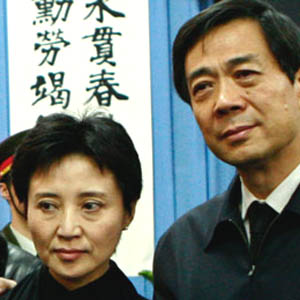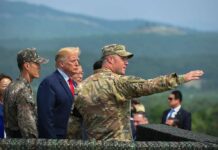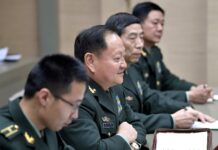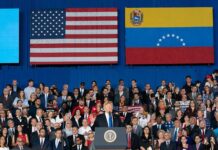Sensational murder trial of princeling wife hides more than it reveals
Vincent Kolo, chinaworker.info
At her one-day trial on 8 August, Gu Kailai, the wife of former CCP (Chinese Communist Party) high-flyer Bo Xilai, confessed to poisoning British businessman Neil Heywood with cyanide at a Chongqing hotel last November.
Bo was deposed in spectacular manner as part of a sharp internal power struggle within the CCP regime. The murder trial has grabbed worldwide attention, as the couple, sometimes described as “China’s Kennedys”, are both members of the so-called ‘red aristocracy’ or ‘princelings’ – fabulously wealthy descendants of revolutionary leaders.
Two weeks after the tightly choreographed trial, Gu received a suspended death sentence while her accomplice, the family butler Zhang Xiaojun, was given a nine-year prison term. It was widely expected that Gu would be spared execution, pointing to a deal behind the scenes that possibly includes her husband escaping criminal prosecution.
While Gu’s case seems straightforward enough given her confession, the bigger story is about what this scripted ‘show trial’ sought to conceal, and why.
“The trial of Gu Kailai is the second cover-up in the history of this affair,” commented Zhang Shujie of chinaworker.info. “The first cover up was carried out by Chongqing police ordered to do so by Gu and probably also Bo, but now the top leaders of the CCP are masterminding an even bigger cover-up for fear of the political consequences to themselves and their system.”
“Political chess game”
As one of the most dramatic criminal cases in China’s modern history, Gu’s trial has generated enormous debate and speculation. The Global Times, a key government mouthpiece, claimed that the trial “sent a message to society that nobody, regardless of his or her status and power, can be exempt from punishment if he or she behaves unscrupulously”. Few people however will fall for this version. Many have been quick to dismiss the proceedings as a “farce” and many also describe Gu as a “pawn in a political chess game”. There is no shortage of conspiracy theories doing the rounds, including one that claims a ‘Gu look-alike’ was used for the trial. Such fanciful theories just underline how great is the distrust and scepticism towards anything the official media reports. We can agree, however, that this was a trial designed to deceive public opinion.
“Not since Stalin’s show trials of the 1930s has a defendant so effusively praised a judge who seemed bound to condemn her at a trial where no witness or evidence against her was presented,” commented author Ma Jian.
The difference is that almost all the victims of Stalin’s show trials were innocent of the monstrous charges against them, which were concocted to justify Stalin’s horrific purges against genuine socialists. Gu, by contrast, is probably guilty of a lot more than she has been tried for, and the manipulation of her trial serves a different aim – to contain rather than extend a governmental purge that the regime fears could tear it apart. The central leadership around president Hu Jintao is attempting to put internal factional infighting on hold and present a ‘united’ image ahead of the imminent leadership transition. With a deepening economic slowdown and rising social unrest, the ruling group fears the political ramifications among the masses of continuing its purge against Bo and his supporters.
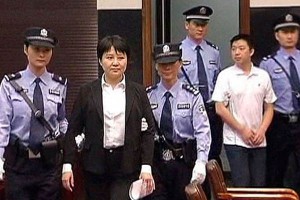
Money laundering
The court proceedings all but glossed over Heywood’s widely reported role as money-launderer to the Bo family. Heywood told friends he had helped the Bo family smuggle huge amounts of money overseas. According to foreign media reports, based on information leaked by CCP insiders, Bo took 1 billion yuan in bribes while head of Chongqing’s government, just for handing out promotions. Gu reportedly laundered as much as 8 billion yuan (US$1.2 billion) overseas. This explains how Bo, nominally paid an annual government salary of around US$26,000, could put his son Bo Guagua through a US$600,000 education in England and the US. With the help of Heywood, himself an ex-Harrow schoolboy, the younger Bo became the first Chinese student to attend the elite school at Harrow, which has produced seven British prime ministers including Winston Churchill.
By focusing on the murder rather than ‘economic crimes’, Gu’s trial opens the prospect of a ‘soft landing’ for Bo – a scenario in which he is dealt with only through the CCP’s own disciplinary system for ‘violation of rules’ but spared criminal charges. This, on condition that he exits the political stage without a struggle. That Bo himself was not mentioned in the trial has heightened speculation that a deal has been done.
‘Mitigating circumstances’
The script followed by Gu at the trial, stressed that she suffered a ‘mental breakdown’ and that her motive for poisoning Heywood was fear for the safety of her son. This shift of focus – away from economic skulduggery – created ‘mitigating circumstances’ both to spare Gu’s life, but also to conceal more politically damaging issues.
The idea that Gu’s motive was her son’s physical safety does not hold water. As Ma Jian points out (South China Morning Post, 22 August 2012): “Given Gu’s power as Bo’s wife, she could have had someone like Heywood jailed or expelled from China at the snap of her fingers. No need for cyanide.”
The trial heard that Gu and her son got into “conflicts” with Heywood over “economic interests”. No details were reported in official media, but observers at the trial (who were not allowed pens or paper) have since revealed that Heywood made threats over demands for a ten percent cut of a US$200 million financial transaction linked to building projects in Chongqing and France.
The trial heard that Heywood had threatened in an email to “destroy” Bo Guagua unless they paid him. “I must fight to my death to stop the craziness of Neil Heywood,” Gu is reported to have said. However, the alleged e-mails were not presented in court, according to observers. Representatives of the British government confirmed the existence of such emails but said the intended threat was to Bo Guagua’s reputation, not his physical well being. Gu claimed that Heywood had even “locked up” Bo Guagua at a “residence in England”, while according to reports he was not in England at the time.
Damage limitation
Such is the mounting public anger over government corruption in general and the monumental financial swindling of the ‘princelings’ in particular, that a full public airing of the Bo family’s dirty laundry poses a threat to the ruling elite as a whole, not just to Bo and his factional allies. As vice-premier Zhang Dejiang, who replaced Bo as head of Chongqing’s government, confessed, this affair has already “brought serious damage to the image of the country and the party”.
Beijing’s main concern with the trial of Gu Kailai was to keep lurid details of corruption and million dollar deals out of the headlines, for fear of triggering further tumult within the state and society. “Revealing the skeletons in Bo’s closet also meant revealing the secret world of the ‘red aristocracy’,” noted Ma Jian. The central government appears to have backed away from such a course, under pressure from the princelings and their main spokesman, former president Jiang Zemin. Regardless of whether they support Bo or not, the princelings as an elite group fear for their own positions if Bo is publicly ‘destroyed’. Despite intense rivalries, the various CCP factions are held in check by the risk of ‘mutually assured destruction’ should the power struggle get out of control.
As The Economist commented: “Party leaders have a good motive for containing the case against Mr Bo: they do not want to highlight the wealth amassed by his family. Many of them have rich friends and relatives of their own. This may explain why Ms Gu faces prosecution for murder but not, as yet, for economic crimes.”
It is a fitting comment on the nature of CCP rule that committing a grisly murder represents the ‘lesser evil’ from the standpoint of the state!
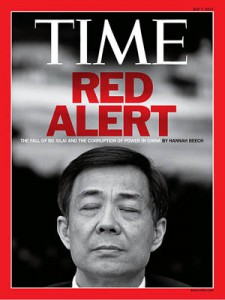
Neutralising the Bo threat
Bo has been a divisive figure within the CCP’s hierarchy, enjoying significant support inside the party, military and society at large. He was brought down in March by a coalition of opponents including the liberal so-called ‘reform wing’ who hope to strengthen their own position by weakening the grip of the ‘princelings’. But even non-reformers resented Bo’s populist rhetoric and his refusal to meekly toe the central government line.
His ‘Chongqing model’, which combined some, limited and overhyped social reforms with populist ‘red culture’ campaigns, became a rallying point for neo-Maoists who oppose the pro-capitalist agenda of the central government. But Bo’s ‘anti-capitalism’ was as bogus as his pretensions to live a modest lifestyle. In fact, as the Financial Times (21 July 2012) pointed out, “Foreign investors were besotted with Bo.” As party boss in Chongqing from 2007 to 2012, he skilfully used his connections from his earlier stint as China’s trade minister to draw major multinational companies to the city. Foreign investment into Chongqing increased ten-fold during Bo’s tenure. Today, 200 of the world’s top 500 multinational corporations (including Apple, Ford, Acer and Hewlett Packard) have operations in Chongqing, taking advantage of government ‘sweeteners’ that include tax breaks, cheap land and government recruitment of labour.
“But Bo got too big for his boots,” commented British author Jonathan Fenby. In a system where Beijing’s policies are often ignored or overridden by local governments, Bo set a dangerous precedent through his high profile political campaigns designed to win him a place at the CCP’s top table – the nine-member Politburo Standing Committee. While the Heywood murder and attempted cover-up provided the pretext to remove Bo, this was in the first case a political rather than criminal matter (despite vehement denials in the official media).
Gu’s role in the murder was apparently revealed by Bo’s former right-hand man and police chief Wang Lijun, in the mysterious dossier he took with him the US consulate in Chengdu on 16 February. Wang is now himself on trial for treason following this attempted defection. Wang’s fate is uncertain, but it is possible he too will escape the death penalty, despite the more serious nature of his crime. There is speculation that Wang has provided further incriminating evidence against his former comrade that can be stored and used as ‘insurance’ that Bo leaves the political scene without a fight.
“The party is holding the evidence, and would use it to purge Bo if he attempted to challenge its authority,” said Zhang Lifan, formerly of the Chinese Academy of Social Sciences. “I believe Bo and his supporters also hold some evidence of wrongdoing against his challengers, and they would use this evidence for their personal gain if they felt that Bo’s case was being handled too severely.” [South China Morning Post, 21 August 2012]
The above scenario is quite plausible in a system where corruption and intrigue is rife. It is widely reported that Bo and his supporters organised phone tapping of political rivals including president Hu Jintao. But such intra-factional espionage is evidently widespread. The developments that triggered the ‘Wang Lijun affair’ (his dismissal and flight to the US consulate) and blew the lid off the Heywood murder are rooted in this power struggle. Quoting high-ranking CCP members, Jamil Anderlini revealed in the Financial Times (21 July 2012) that “powerful retired and serving members of the party elite, who oppose Bo Xilai’s bid for promotion… launched a secret party investigation to gather evidence on him and his family and associates… These efforts included a prolonged investigation into police chief Wang Lijun and especially into his previous role as police chief in the medium-sized north-eastern city of Tieling.”
It is known that in May 2011, Wang’s successor as police chief and vice-mayor in Tieling, Gu Fengjie, was detained by anti-corruption investigators. These moves were initiated by supporters of Hu’s faction and Wang surely saw this as a sign the net was closing in around him. Wang is believed to have sought Bo’s protection by confronting him with evidence of Gu’s role in the Heywood murder. When Bo rejected Wang’s approach this only hastened the fall of Bo himself.
The secret deals that appear to have been struck in order to ‘limit’ this scandal and secure an orderly leadership transition do not mean the end of the CCP’s internal power games. At best they represent a pause. The struggle over how to perpetuate the current regime (towards more, or less, authoritarian methods) alongside the manoeuvring between powerful party cabals over the division of economic spoils is set to continue and intensify. Socialists and supporters of chinaworker.info warn against illusions in any of the CCP’s factions, none of whom represent the interests of the working class. We stress the need for mass struggle for full democratic rights and for the creation of independent workers’ organisations around a socialist programme to place the running of the economy and society under mass democratic control.

